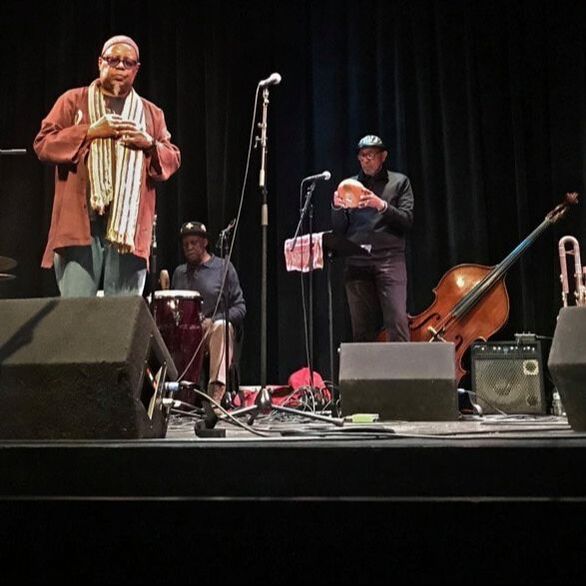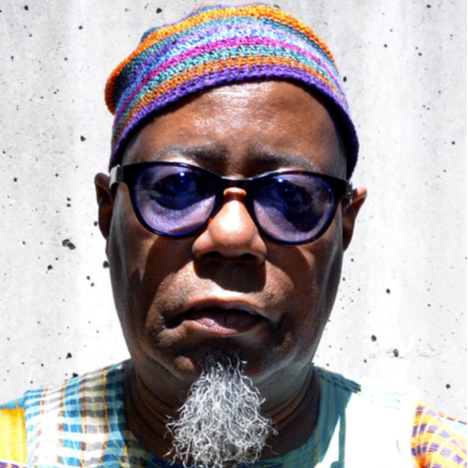Program
Performers
|
Dwight Trible Vocals / Kalimba |
|
|
Pablo Calogero Woodwinds / Flutes / Percussion |
|
|
Breeze Smith Drumset / Electronics / Percussion |
|
|
Tony Green Upright Bass |
|
|
Christopher Garcia Tabla / Gongs / Meso-American Percussion |
|
|
Dan Rosenboom Trumpet / Electronics |
|
When I first asked Dwight Trible about playing on the Golden Thread Concert Series and told him we are interested in exploring how musicians use music as a spiritual practice, he laughed and said “These musicians, they’re all in tune, they’re all spirit.”
I only heard the term ‘spiritual jazz’ for the first time recently. I didn’t know what it meant as a genre or which musicians were associated with it, but wasn’t surprised to know the concept existed. I’ve always had a sense that Jazz maintained a mystical core. It’s true there is a technical side to improvisation, learning your scales and arpeggios, hours of practice perfecting them, following the changes in a song's harmony all speak to the intense technical mastery of the art form. But improvisation also naturally embraces that which is beyond the analytic, rational mind. The raw power and energy of jazz speaks to truth beyond those found in ordered constructs.
Listen to some of these quotes about the nature of music from legendary jazz musicians, some of which seem closer to zen koans than descriptions of a music style:
“Jazz is not a what, it is a how." - Bill Evans
"Don't play what's there, play what's not there." - Miles Davis
"What I'm dealing with is so vast and great that it can't be called the truth. It's above the truth." - Sun Ra
And perhaps, most directly, from John Coltrane, who said,
“My music is the spiritual expression of what I am – my faith, my knowledge, my being… When you begin to see the possibilities of music, you desire to do something really good for people, to help humanity free itself from its hangups … I want to speak to their souls.”
How else can we speak to the soul of another except from our own? An authentic spiritual performance is a direct transmission through sound from one soul to another sharing that which is beyond words. While I resist the notion that music is a universal language, it certainly has the power to communicate truths outside of rational understanding to those on the same frequency. Such music can be a transcendent spiritual practice, one in which the individual performers find spiritual attunement within themselves, each other, the audience.
The focus of these musicians is channeling the spiritual, both material and not, the power that is really in charge, tapping into the cosmic vibration. The Holy Spirit. The only way to get there is moving past the ego, letting go and being a conduit. What the composer Michael Skloff calls, “opening the aperture”. Let all that spirit flow through, raw, maybe chaotic, but soaked in truth. We get to hear that today, and perhaps open and expand ourselves a little more than before. Sufi poets instruct us to be like reed flutes, perfectly hollow to allow the musician’s breath to blow through us. Only then can our music be heard.
Program
Performers
|
Dwight Trible Vocals / Kalimba |
|
|
Pablo Calogero Woodwinds / Flutes / Percussion |
|
|
Breeze Smith Drumset / Electronics / Percussion |
|
|
Tony Green Upright Bass |
|
|
Christopher Garcia Tabla / Gongs / Meso-American Percussion |
|
|
Dan Rosenboom Trumpet / Electronics |
|
When I first asked Dwight Trible about playing on the Golden Thread Concert Series and told him we are interested in exploring how musicians use music as a spiritual practice, he laughed and said “These musicians, they’re all in tune, they’re all spirit.”
I only heard the term ‘spiritual jazz’ for the first time recently. I didn’t know what it meant as a genre or which musicians were associated with it, but wasn’t surprised to know the concept existed. I’ve always had a sense that Jazz maintained a mystical core. It’s true there is a technical side to improvisation, learning your scales and arpeggios, hours of practice perfecting them, following the changes in a song's harmony all speak to the intense technical mastery of the art form. But improvisation also naturally embraces that which is beyond the analytic, rational mind. The raw power and energy of jazz speaks to truth beyond those found in ordered constructs.
Listen to some of these quotes about the nature of music from legendary jazz musicians, some of which seem closer to zen koans than descriptions of a music style:
“Jazz is not a what, it is a how." - Bill Evans
"Don't play what's there, play what's not there." - Miles Davis
"What I'm dealing with is so vast and great that it can't be called the truth. It's above the truth." - Sun Ra
And perhaps, most directly, from John Coltrane, who said,
“My music is the spiritual expression of what I am – my faith, my knowledge, my being… When you begin to see the possibilities of music, you desire to do something really good for people, to help humanity free itself from its hangups … I want to speak to their souls.”
How else can we speak to the soul of another except from our own? An authentic spiritual performance is a direct transmission through sound from one soul to another sharing that which is beyond words. While I resist the notion that music is a universal language, it certainly has the power to communicate truths outside of rational understanding to those on the same frequency. Such music can be a transcendent spiritual practice, one in which the individual performers find spiritual attunement within themselves, each other, the audience.
The focus of these musicians is channeling the spiritual, both material and not, the power that is really in charge, tapping into the cosmic vibration. The Holy Spirit. The only way to get there is moving past the ego, letting go and being a conduit. What the composer Michael Skloff calls, “opening the aperture”. Let all that spirit flow through, raw, maybe chaotic, but soaked in truth. We get to hear that today, and perhaps open and expand ourselves a little more than before. Sufi poets instruct us to be like reed flutes, perfectly hollow to allow the musician’s breath to blow through us. Only then can our music be heard.
Performers
|
Cosmic Vibrations |
A genre-defying amalgamation of divine vocals, soul-stirring jazz, healing poetry, with a rich tapestry of African, Mesoamerican and indigenous North American percussion and instrumentation, taking you on a cosmic journey of spiritual improvisation and beyond. Cosmic Vibrations is a supergroup of heavyweight musicians with a vast combined experience, an ensemble of 6 souls who approach improvisation full of spirit and without ego. Gathered for this very purpose by Dwight Trible, undoubtedly the most acclaimed and in-demand vocalist currently working in the realms of spiritual jazz, the band has been performing steadily over the last three years, building a reputation in LA and further afield for their electric, mesmerizing performances. |
|
A show-stopping performer and artist, Dwight Trible has directed the legendary Horace Tapscott Pan Afrikan Peoples Arkestra, and performed alongside with the likes of Pharoah Sanders, J Dilla, Gary Bartz, Kamasi Washington, Kahil El'Zabar, Madlib, Charles Lloyd, Matthew Halsall, Georgia Anne Muldrow, Soil & "Pimp" Sessions, Mark de Clive-Lowe, and Carlos Niño. There is indeed no one today who better carries on the tradition of legendary iazz vocalists such as Terry Callier, Leon Thomas and Andy Bey, whilst carrying that torch forward and exploring brand new territory. Apart from his rich vocal tones, Trible is also heard on kalimba. |
Dwight Trible |
|
Dwight Trible |
A show-stopping performer and artist, Dwight Trible has directed the legendary Horace Tapscott Pan Afrikan Peoples Arkestra, and performed alongside with the likes of Pharoah Sanders, J Dilla, Gary Bartz, Kamasi Washington, Kahil El'Zabar, Madlib, Charles Lloyd, Matthew Halsall, Georgia Anne Muldrow, Soil & "Pimp" Sessions, Mark de Clive-Lowe, and Carlos Niño. There is indeed no one today who better carries on the tradition of legendary iazz vocalists such as Terry Callier, Leon Thomas and Andy Bey, whilst carrying that torch forward and exploring brand new territory. Apart from his rich vocal tones, Trible is also heard on kalimba. |




